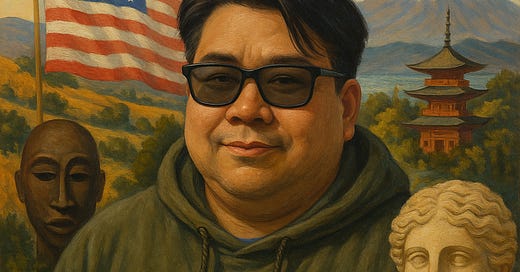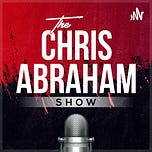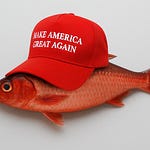I hadn’t planned to write this.
What started as a thread—just me reflecting on a conversation with someone named Kim—turned into something deeper. The discourse was layered, tense, even frustrating at times. But somewhere in it, I found myself revisiting a piece of my own story that refuses to be silenced.
I grew up in Salt Lake, Oahu, in a modest garden apartment complex near the airport. I was six. A haole kid—Irish, English, German, Czechoslovakian, Hungarian—trying to find a place among a sea of names that rolled off the tongue like music: Sakai, Maeda, Park, Chan. My friends were a mix of Japanese, Korean, Filipino, Chinese, Samoan. We were all poi dogs—mutt kids proud of the stories written into our blood.
But by intermediate school, that pride started to slip.
Suddenly I wasn’t a mutt. I was just “white.” Just haole. Like all the specificity of my ancestry—my father’s stoic German grit, my mother’s Irish laughter, my nana’s hushed Czech prayers—had been wiped clean with a single slur. It was flattening. It was erasure.
That memory still lives in me.
And that’s what brought me back to this question that seems to haunt American identity:
Was America ever meant to be an ethnostate?
I don’t think so. In fact, I know it wasn’t.
From the beginning, this country was chaotic. Contradictory. Alive with migration, with faiths, with fractured languages and fragile alliances. Yes—there were settlers who dreamed of purity. But purity wasn’t the project. The project was possibility.
America’s original sin wasn’t its diversity. It was its hypocrisy: the dream of liberty, yoked to slavery. But even then, this land was a stew. There were free Black citizens before slavery fully industrialized. There were Jews in New Amsterdam. Hawaiian royalty once visited the White House.
We’ve always been messy.
Compare that with actual ethnostates. Japan. Korea. Hungary. Places where ancestry is law, and legitimacy flows through blood. Where even second- or third-generation immigrants often live as outsiders. Where assimilation isn’t expected—because it isn’t offered.
And yet, somehow, it’s America that bears the moral burden of failing to be perfect.
I’m not writing this to dodge that burden. I’m writing it to ask for some honesty.
Whiteness in America has never been stable. Irish weren’t white. Italians weren’t white. Jews weren’t white. Slavs weren’t white. Whiteness was never about skin tone. It was a constantly shifting proximity to power—a gatekeeping system with rules that changed depending on who was inside the gate.
And now, people who demand the most exacting forms of nuance for themselves—insisting on distinctions between Dominican and Puerto Rican, Korean and Japanese, Hmong and Vietnamese—will turn around and reduce every pale-skinned person to “white.”
That’s not justice. That’s just reversal.
If we want pluralism, we have to mean it. That means everyone gets a seat. Even people like me.
Let me say this clearly: I believe in listening. I believe in honoring pain. But not all pain comes with a press pass. Some of us are hurting quietly. Carrying the stories of our ancestors in our chest like uncashed checks. We don’t want to dominate the conversation. But we don’t want to be told we don’t belong in it, either.
Frank Park was my first friend. I was six years old. His mother grilled kalbi on a hibachi outside their apartment. She gave me my first bite of kimchi. My mother—new to the islands and unsure—wrinkled her nose at the smell. But I didn’t. I loved it. That flavor lit something up in me.
Today, I still eat kimchi from the Korean-run store downstairs. I still remember Frank. That memory, too, is part of America.
And it’s not just personal. When I started exploring Mastodon, the federated social network filled with ideological sub-communities, I stumbled into one of the darker corners—a conversation with a white supremacist. He told me, quite plainly, that as an Irish-Hungarian American—and Catholic, no less—I wasn’t really white. Not to him. Not to those who see whiteness as reserved for the “true bloodlines” of ethnic English and Germans.
He pointed to the British monarchy as proof: German blood in English robes. I was told my Irish Catholic roots from County Mayo and my Hungarian background from Budapest made me, at best, a cultural mimic. At worst, a mudblood. Garbage people. Untermench.
I’d heard that term before, living in Berlin—often whispered, never claimed. But I started owning it. There’s power in naming what others use to shame. The book Bloodlands left a deep impression on me—not just for its history, but for how the language of the "underman" was used to justify unspeakable acts. And yet, here I am, labeled the same by people who look like me but see me as lesser.
It’s not just an American phenomenon. In Singapore, social hierarchies are carved along Han Chinese lines. In Finland, Swedish elites dominate, while native Finns are treated as second-class in their own country. In every so-called homogeneous society, someone is always “less than.”
So when we talk about supremacy, about privilege, about who sits at the table and who doesn’t—we have to acknowledge that these hierarchies exist everywhere. And that purity is a myth used to exclude, not elevate.
So when we talk about justice, let’s also talk about class. Let’s talk about UBI. About how grievance and sedation can sometimes do the same thing: keep people from rising. Make them comfortable just enough to stop reaching. Just enough to stay put.
That’s not freedom. That’s management.
And still—still—I believe in this country. Not because it’s pure. But because it’s unfinished.
It’s the only place I know where poi dogs can speak.
So no, America isn’t an ethnostate. And the fact that we even try to include everyone—even when we fail—is something extraordinary.
It’s messy. But it’s ours.
And I’ll defend that—with aloha.
tl;dr
The source, "Poi Dogs and Purity Tests: Why America Was Never an Ethnostate" by Chris Abraham, challenges the notion of America as a historically homogeneous nation. Abraham uses his personal experiences as a multi-ethnic "poi dog" from Hawaii to argue that the country has always been a diverse "stew" of cultures and peoples. He contrasts America with actual ethnostates like Japan and Korea, highlighting how American identity, including "whiteness," has been fluid and often a tool of shifting power dynamics. The author contends that the dream of purity is a myth used for exclusion, and despite its imperfections, America's ongoing effort to include everyone is what makes it unique.













Share this post